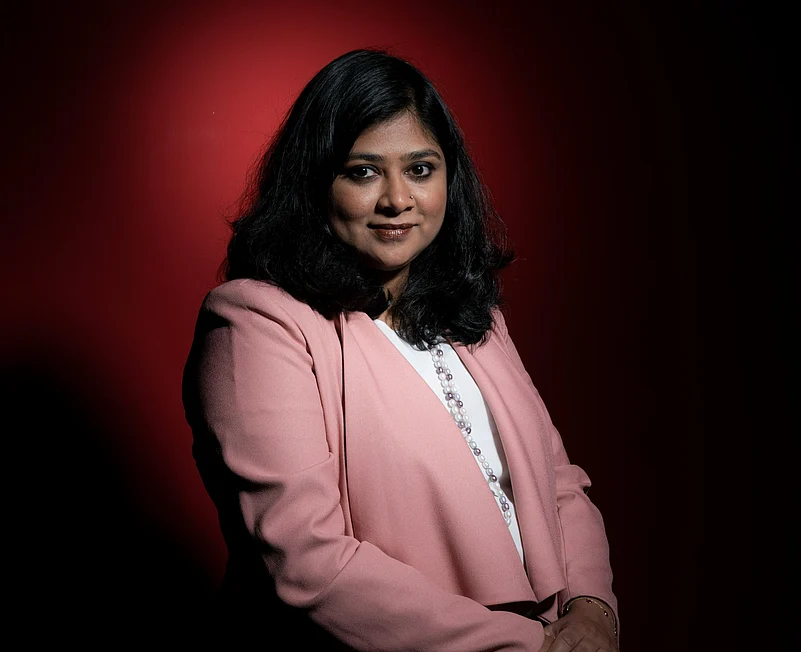Managing plastic waste, especially in the packaging industry, remains a significant challenge for companies. With the rise of e-commerce and quick commerce deliveries, it has become imperative for brands to take responsibility for the waste generated by their packaging. Eternal, formerly known as Zomato, has taken a leadership role in driving sustainable packaging innovations and greening its delivery chain.
In an exclusive conversation with Outlook Business, the company’s Chief Sustainability Officer Anjalli Ravi Kumar discusses their multi-pronged push toward sustainable food delivery—from targeting 100 million plastic-free orders by FY2026 to spotlighting startups innovating with seaweed and coconut-based packaging. While regulatory clarity around recycled plastics remains a work in progress, the company is relying on partnerships and voluntary accountability to help build a circular and less wasteful delivery ecosystem. Edited excerpts from the interview:
You have a target of 100 million plastic-free food orders by FY2026. What is your current status on that, and what kind of impact have you seen since the rollout? Can you say that Zomato is completely plastic-free when it comes to delivery packages?
At Zomato, one of our key sustainability goals is working toward a waste-free world. For food delivery, that means minimizing both packaging and food waste. However, since we're a platform, the packaging decisions largely lie with restaurants, and disposal occurs at the consumer’s end—our influence remains indirect.
We really can’t dictate packaging choices, mainly to large brands like McDonald’s or Starbucks, whose packaging is closely tied to their brand identity. What we can do is support and guide. Through our B2B arm, Hyperpure, we offer approximately 100 sustainable packaging options, which are used by around 10,000 to 12,000 restaurants each month. While this is just a fraction of the 2.5 lakh restaurants on Zomato, it’s a start.
We’ve also launched initiatives to encourage the shift. The Plastic Free Future programme identifies and labels restaurants that use minimal plastic for their main dishes and beverages. You’ll see a “Low Plastic Packaging” tag on their menu pages. So far, around 200 brands and 7,500 restaurants qualify.
As startups emerge as powerful engines of innovation in sustainable materials, how is Zomato collaborating with or supporting these players in the ecosystem?
Beyond just recognition, we’re driving innovation. Many restaurants hesitate to switch because of functionality—there’s no perfect alternative yet for items like sambar, chutney, or raita. That’s where Packathon comes in. We brought 127 packaging startups into the spotlight, with 10 finalists pitching directly to restaurants at Bharat Mandapam. These startups are experimenting with exciting materials like seaweed, coconut, and even water lily waste. Our goal is to connect them with restaurateurs who can provide practical feedback and accelerate innovation.
Additionally, we are addressing existing plastic use through our Plastic Neutral Deliveries programme. We’ve worked with a third-party consultant to estimate the plastic footprint of restaurants on our platform, and we’re committed to recycling 100%—actually, more than 100%—of that. So far, we’ve recycled over 45,000 metric tons. It’s not technically our plastic, but we’ve taken this up voluntarily because we believe it’s the right thing to do.
So these are our key efforts: enabling better choices, celebrating sustainable restaurants, supporting packaging innovation, and compensating for current plastic use—all steps toward a truly waste-free delivery ecosystem.
How do you view the usage of recycled plastics for food-grade packaging? Has Zomato explored any innovations around incorporating recycled plastics?
As I mentioned earlier, Zomato itself neither manufactures nor purchases packaging for direct use—that’s entirely the restaurant’s decision. However, our subsidiary, Hyperpure, maintains an inventory of both plastic and sustainable packaging options that restaurants can choose to purchase.
In India, the FSSAI currently permits the use of only recycled PET (rPET)—the type used in bottles like Bisleri or Coke—for making new PET bottles. No other form of recycled plastic is currently permitted for food-related uses. So, while we’ve recycled 45,000 metric tons of plastic waste, it’s being repurposed for non-food-grade items, such as detergent bottles or paint cans.
One of the key challenges is that different types of plastic have distinct properties. The plastic in a food delivery container isn’t the same as that used for beverage bottles. Plus, India’s waste management system is largely informal—unlike in the West, where it is more organized and better funded. In such systems, contamination risks are lower, and recycling quality is higher.
Until India has more robust, contamination-free recycling processes, it’s wise to be cautious about using recycled plastics for food packaging—and that’s exactly what regulators are doing.
Do you think Indian consumers are ready to embrace recycled plastic packaging in food delivery? What is Zomato doing to build trust and awareness?
As of now, FSSAI hasn’t issued clear guidelines on the use of recycled plastics for food applications, so we’re waiting for their decision. Once those rules are in place—covering when and how recycled plastic can be used and what quality standards it must meet—we’ll have more clarity on how to communicate with consumers.
In the meantime, it’s important to educate people that not all plastic is unsafe. If you receive food in plastic packaging, simply check the bottom—if it says 'PP5' and is labelled as microwave-safe, it has passed all food-grade safety tests. Just like we’re taught to read food labels, we should also learn to read packaging symbols.
At Hyperpure, all plastic packaging we offer is BPA-free, microwave-safe, and 100% food-grade, verified by vendors. Recycled plastic, too, can be safe—as long as strict quality standards and enforcement are in place.




























